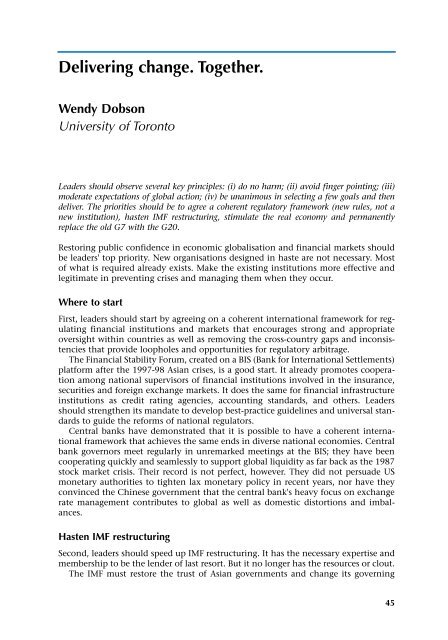What G20 Leaders Must Do To Stabilise our Economy and Fix ... - Vox
What G20 Leaders Must Do To Stabilise our Economy and Fix ... - Vox
What G20 Leaders Must Do To Stabilise our Economy and Fix ... - Vox
You also want an ePaper? Increase the reach of your titles
YUMPU automatically turns print PDFs into web optimized ePapers that Google loves.
Delivering change. <strong>To</strong>gether.Wendy <strong>Do</strong>bsonUniversity of <strong>To</strong>ronto<strong>Leaders</strong> should observe several key principles: (i) do no harm; (ii) avoid finger pointing; (iii)moderate expectations of global action; (iv) be unanimous in selecting a few goals <strong>and</strong> thendeliver. The priorities should be to agree a coherent regulatory framework (new rules, not anew institution), hasten IMF restructuring, stimulate the real economy <strong>and</strong> permanentlyreplace the old G7 with the <strong>G20</strong>.Restoring public confidence in economic globalisation <strong>and</strong> financial markets shouldbe leaders' top priority. New organisations designed in haste are not necessary. Mostof what is required already exists. Make the existing institutions more effective <strong>and</strong>legitimate in preventing crises <strong>and</strong> managing them when they occur.Where to startFirst, leaders should start by agreeing on a coherent international framework for regulatingfinancial institutions <strong>and</strong> markets that enc<strong>our</strong>ages strong <strong>and</strong> appropriateoversight within countries as well as removing the cross-country gaps <strong>and</strong> inconsistenciesthat provide loopholes <strong>and</strong> opportunities for regulatory arbitrage.The Financial Stability Forum, created on a BIS (Bank for International Settlements)platform after the 1997-98 Asian crises, is a good start. It already promotes cooperationamong national supervisors of financial institutions involved in the insurance,securities <strong>and</strong> foreign exchange markets. It does the same for financial infrastructureinstitutions as credit rating agencies, accounting st<strong>and</strong>ards, <strong>and</strong> others. <strong>Leaders</strong>should strengthen its m<strong>and</strong>ate to develop best-practice guidelines <strong>and</strong> universal st<strong>and</strong>ardsto guide the reforms of national regulators.Central banks have demonstrated that it is possible to have a coherent internationalframework that achieves the same ends in diverse national economies. Centralbank governors meet regularly in unremarked meetings at the BIS; they have beencooperating quickly <strong>and</strong> seamlessly to support global liquidity as far back as the 1987stock market crisis. Their record is not perfect, however. They did not persuade USmonetary authorities to tighten lax monetary policy in recent years, nor have theyconvinced the Chinese government that the central bank's heavy focus on exchangerate management contributes to global as well as domestic distortions <strong>and</strong> imbalances.Hasten IMF restructuringSecond, leaders should speed up IMF restructuring. It has the necessary expertise <strong>and</strong>membership to be the lender of last resort. But it no longer has the res<strong>our</strong>ces or clout.The IMF must restore the trust of Asian governments <strong>and</strong> change its governing45














